An effective Root Cause Analysis (RCA) report captures the story of an event, explaining its causes and context while proposing actionable solutions to reduce risk and build resilience. By moving beyond the myth of a single “root cause,” it addresses both specific contributors and systemic issues within the context of the event. A well-crafted report also highlights what went well, preserves key learnings for the future, and communicates insights in a way that resonates with diverse audiences. When done right, an RCA report is a tool for learning, continuous improvement, and driving meaningful change.

Facilitating Learning Events
November 08, 2024
In safety and performance work, we often rely on methods like Learning Teams, Root Cause Analysis (RCA), and Failure Modes and Effects Analysis (FMEA) to understand and resolve complex issues. But is there really a difference between these approaches? And what does it take to facilitate learning, not just process? In this blog, we explore how effective facilitators keep learning at the forefront, knowing when to stick to structure and when to adapt. Along the way, we’ll consider the value of diverse perspectives—including the role AI can play in enriching our understanding.

Mentoring New Problem Solving Comrades
October 23, 2024
Mentoring is more than just offering advice—it’s about helping others reach their full potential by guiding them through the ups and downs of their learning journey. In this blog, we’ll explore the powerful impact mentoring can have on personal and professional development, diving into the key elements of effective mentoring, from building trust to encouraging growth. Whether you’re a seasoned mentor or just starting out, understanding how to support, challenge, and inspire your mentees can make all the difference.

Causelink 8.0
October 03, 2024
Artificial intelligence is revolutionizing organizational learning by helping teams process massive amounts of data, identify contextual patterns, and suggest meaningful solutions. With the release of Causelink Version 8.0, Sologic is introducing AI-powered features designed to enhance identifying solutions and to streamline reporting. These tools empower teams to make smarter, faster decisions, while AI’s ability to analyze complex data provides valuable insights that complement human judgment.

Five Whys and Fishbone - Are They Dead Yet?
September 21, 2024
The Five Whys and Fishbone Diagram have been two of the most widely used methods in root cause analysis for decades. While their simplicity and accessibility have made them popular, these traditional approaches often fall short in addressing today’s complex problems. In this blog, we’ll explore their benefits, limitations, and how methods like Sologic® have evolved beyond these tools to offer deeper insights and more effective solutions. Are the Five Whys and Fishbone still relevant, or is it time to move beyond them?

Sologic's Journey to FMEA
May 07, 2024
How did Sologic, who is known for root cause analysis training, consulting, and software find its way to the world of failure modes & effects analysis? When you think about it, they actually complete a synchronous cycle. FMEA helps you predict what might happen and how to best prevent it or prepare for it. And RCA retrospectively looks backwards at what did happen, why/how it happened, and what can be done about it. All it took was a nudge from a key client...

Sanford and Edenville Dam Failures: A Bright Spot Hidden in Tragedy
July 26, 2022
On May 19, 2020, there were two catastrophic, sequential dam failures on Wixom Lake (Edenville) and Sanford Lake on the Tittabawassee River system in central Michigan. These failures forced the evacuation of over 10,000 residents and resulted in damage to homes, businesses, and structures costing hundreds of millions of dollars. Despite the devastation, one very surprising aspect of this event received very little attention; there were no fatalities or serious injuries.

Ishikawa/Fishbone - New in Causelink 7!
June 07, 2021
The Ishikawa/Fishbone diagram has long been used as a tool to help guide excerises brainstorming potential causes based on catagories. Sologic has used the principles of Ishikawa/Fishbone in the process of data gathering from the beginning. Now we've incorporated it into Causelink.

How to Reduce Incidents When Stress is a Root Cause
April 12, 2021
Stress Awareness Month has been recognized every April since 1992, but this year it seems particularly important. Read on to discuss how to recognize and manage stress as a root cause of incidents at work.

Root Cause Analysis Tools For Better Problem Solving
March 23, 2021
Find out some of common tools for problem solving and root cause analysis and their benefits

Human & Organizational Performance
January 18, 2021
Human and organizational performance examines the confluence of systems and people. Systems are relatively static and constant. People are highly variable. These characteristics are really important to overall success. We need predictability and stability in our systems – we don’t want them to change all the time.

What is Fishbone Analysis?
November 27, 2020
The fishbone diagram is a classic root cause analysis documentation technique. This blog explores how the fishbone process works, what makes it effective, and where it may come up short if used on its own.

FMEA - Failure Modes and Effects Analysis
November 25, 2020
Failure Modes and Effects Analysis is a systematic way to identify and either eliminate or mitigate risk. It is forward-looking, which means that it is an effort to accurately predict and control the future. This is important to make sure that an asset is being maintained efficiently and effectively.

Virtual RCA Training Results
May 25, 2020
Virtual training is here to stay. Over the last six weeks, Sologic has delivered numerous multi-day training classes, three significant investigations, multiple webinars, and several train-the-trainer sessions for new instructors – all virtually. Feedback from students has been overwhelmingly positive.

Causelink v6.0 upgrade - Why 5 Whys?
April 28, 2020
Causelink customers from a variety of industries have requested a simple RCA approach for moderate impact incidents; ones that don’t require the rigor of a Sologic RCA. Initially, our response went something like “Just use Causelink and skip the sections that you don’t need”. People have generally made this work. But, when you are tasked with an RCA and focused on analyzing the incident, the last thing you want is to click through un-needed pages. We decided to take this feedback as an opportunity to make Causelink even better– enter the 5Whys+ template.

Virtual RCA Training
March 30, 2020
I taught what is likely my last on-site class for the foreseeable future in mid-March in Minneapolis, MN to a great group of Safety and Quality professionals in the construction business. COVID-19 was on everyone’s mind, but news keeps changing by the hour. The travel bans began rolling out at a furious pace. Truthfully, I’ve traveled enough for three lifetimes over the past 20 years, so a block of time at home wasn’t necessarily unwelcome. But without face to face training, you can’t teach people how to facilitate teams, right? At least not under the old paradigm.

Seven Steps to Virtual RCA
March 19, 2020
We’ve led dozens of virtual RCAs using Causelink and an online collaboration tool, such as Go To Meeting, Web Ex, or Chime. You can do this too. What follows are a set of steps that will help you be an effective RCA facilitator when you are working remotely.

Categorical Logic
March 02, 2020
Investigators use different types of logic when investigating adverse events. In this first of a three-part series, we examine Categorical logic and how it can be used in an RCA.

Causelink for EDU expanding in 2019
March 22, 2019
In the spring of 2018 Sologic started a pilot program called Causelink for EDU. The new program provided universities with free access to Causelink RCA software and eRCA Fundamentals online learning. The goals for the program are to expose students to software, provide instructors with instructional tools and oversight, and receive feedback on Causelink software.

Abstraction Levels
December 13, 2018
When an adverse event occurs that we’d like to keep from happening again, we conduct an investigation. In a Sologic RCA, we create a logic diagram with the “problem” on the left and preceding causes flowing out to the right. This diagram is not the problem, but an abstracted approximation (model) of the problem based upon conditional “if-then” logic.

When Lessons Learnt are Lessons Lost
December 07, 2018
Over 400 years ago, Captain James Lancaster, an English sailor, performed a benchmark experiment in his pursuit of a prevention for a disease called scurvy. Scurvy was one of the biggest problems at sea at that time, killing or debilitating many individual sailors as well as rendering the operational capability of a crew so diminished that the remaining sailors struggled to man their ships safely.

The 'Big Seven' pitfalls when problem solving (and how to avoid them)
December 03, 2018
All organisations have problems and some of those problems are worth solving. Clearly
some teams and some people are better at solving problems than others, so what pitfalls
can you avoid in order to improve your problem solving skills and outcomes?

Risk vs. Return
November 13, 2018
I pick up sharp things when I see them. I’m talking about nails, screws and wire – not glass. Whether I’m on my bike riding around town or walking down the street, I always take the time to stop and pluck any sort of sharp thing up off the ground. Having had my share of flat tires, I know how disruptive they can be. So I gladly do my small part in trying to prevent them before they happen.

Which Boss Are You? Premier League or NFL?
October 01, 2018
Back in 2013/14 the English Premier League reached an all-time low. Incredibly, the average managerial tenure at a club sunk to just 1.84 seasons per active manager. And if you had removed Arsene Wenger’s 18 seasons at Arsenal that figure would have plummeted to just 1.05 seasons per head. Just try to imagine any other multi-billion industry where the COO’s of the 20 leading firms had an average of just 1 year in charge.

Causal Patterns and Five Examples
August 21, 2018
Those of us that do root cause analysis for a living also identify patterns that make our jobs easier, albeit with marginally less screaming and crying. Although we teach cause and effect analysis as being a process of deconstructing effects into their individual causes, that’s not always how we do it professionally. We often find that we’ve been down a certain path before.

Solutions Are Terrible Things to Waste
March 28, 2018
It’s a common scenario – something serious happens, triggering a root cause analysis. The team finds an hour or two to complete the RCA. The meeting concludes with the RCA 80% finished, including a nice list of solutions. Then...
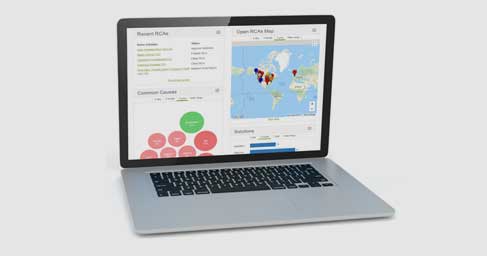
RCA Program Dashboard
February 27, 2018
Like any other process, your root cause analysis (RCA) program requires periodic reporting to help you stay on track. Developing an RCA Program Dashboard can help.

RCA – Past, Present, and Future (a three-part series) Part 3
January 18, 2018
In parts 1 and 2 of this 3-part installment, I discussed the history of RCA up to the current state. I broke up this history into different eras; the beginning of modern structured problem solving, the “Guru Era” whereby early adopters improved upon existing tools, and the introduction of RCA-specific software. So what's next?

I'm in love with 4.0
September 18, 2017
I’m sure you've experienced the strong sense of euphoria often felt after starting a new relationship. You can’t stop thinking about this new person and they help fill your world with a kaleidoscope of sounds and colors. You can’t imagine yourself being happy with anyone else. Well, I’m feeling that way about Causelink Enterprise Version 4.0! Here’s why...

RCA – Past, Present, and Future (a three-part series) Part 2
August 16, 2017
Let’s travel back three or four decades to the period of main-frame computers, pocket protectors, and ashtrays in the office. Engineers at the DOE, NASA, and a variety of other organizations were working on problems of enormous complexity. The failures were therefore equally complex. But persistent failure was simply not an option, so they developed new ways of thinking to help manage this complexity. Not surprisingly, they discovered deficiencies in these methods.

RCA – Past, Present, and Future (a three-part series) Part 1
May 02, 2017
An attendee at a public seminar recently asked if I’d compare and contrast RCA methods. I can appreciate this question. I mean seriously – put yourself in the position of someone tasked with identifying an RCA method. How do you choose? What would be the basis of your choice?

Tactical Root Cause Analysis Course
February 14, 2017
We are now offering a condensed class, stripped of all but the most essential topics, while preserving the most important deliverable: Assembling a high-quality root cause analysis.

“OK Google, what caused my project to be 6 weeks late and $300,000 over budget?”
January 11, 2017
Through ongoing development of artificial intelligence(AI)/cognitive computing, the answers to complex problems are becoming more available (and getting more accurate) as data sets expand.

Tuning out the Noise
November 29, 2016
You aren’t going to completely stop the cycle of reactivity with one RCA, but you will begin to slow it down. That’s a start. Build on it. Things will get better. Who knows, it may even leave you with enough time to actually watch your daughters game as opposed to just being there physically and spending most of your time on your phone responding to emails from people who want to know when the latest problem will be resolved.
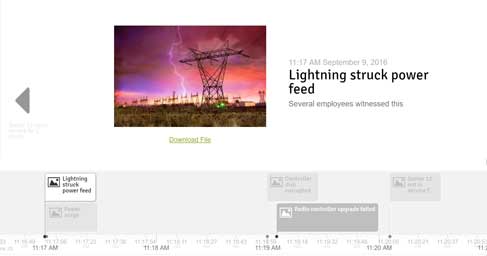
Causelink Incident Timeline Beta Release
September 13, 2016
During focus group sessions we learned that not only should the timeline be interactive and support the editing of details for each event, but there should also be a way to add these events as causes on the cause and effect chart. We also learned how the timeline fits into user workflow during an incident investigation, knowledge which helped in making decisions about navigation and user interaction.
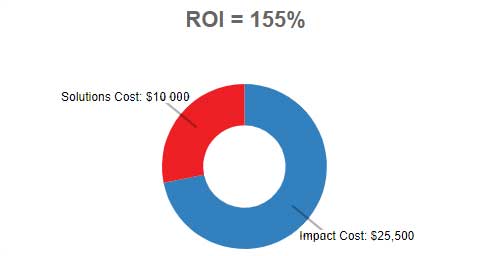
Use ROI To Improve Your Root Cause Analysis Program
August 29, 2016
While the money you spend to investigate the problem and implement solutions is real, your returns equate to a reduction in risk. In other words, the problem cost you a lot of money and now you are going to spend a little more in order to reduce the risk of the problem happening again.

How Roxy Helped Release Causelink 3.0
May 19, 2016
My favorite part of this release has been reviewing the software, mobile phone in hand, while strolling around my backyard. The neighbors must have thought I was crazy as I talked through the “hazardous spill” I was “investigating”, while uploading photos and videos of our new puppy, Roxy.

RCA Programs - A How-To Guide
March 31, 2016
Let’s start this conversation by defining a problem as an event resulting in a significant deviation from our goals and objectives. How many events fitting this description occur over any given week (month, year) at your company?

Monitoring vs. Root Cause Analysis – Is There a Unicorn System?
March 03, 2016
Automated root cause analysis systems seemingly provide the Problem Manager with his/her “problem unicorn” – a system that collects your data, analyzes your problems, and identifies solutions, all without human participation! Unfortunately, much like the mythical unicorn of lore, this system does not exist in reality.

The RCA Phoenix
February 19, 2016
Like the phoenix of Greek mythology that emerges from the ashes of its predecessor, Root Cause Analysis programs have been undergoing similar transformations recently. We examine the causes of program failure during the recession, and provide a roadmap to get you back on track.span>

Did Human Error Cause This Train Crash in Bavaria?
February 18, 2016
Did human error cause this fatal train crash? Should the operator be punished? We examine these questions and provide guidance for how to deal with human error in your root cause analyses.

A Great Year for RCA Software
December 16, 2015
This holiday season we want to say thank you to everyone who has provided feedback – you know who you are! Thanks to you, we’ve focused our software development team on the features that provide the most value, while also experimenting with new technologies that will drive future innovations in problem solving. Here is a look back at the highlights from 2015.

Home Grown—What RCA Investigations should we lead?
November 28, 2015
“Should I have one of my people lead this investigation, or should I farm it out to a 3rd party?” The answer depends on a few things including concerns about liability, desired turnaround time, availability of skilled, in-house facilitators, internal politics, the need for impartiality and budget.

Faster Chart Building
November 16, 2015
Leading a productive and efficient cause and effect chart building session is important, especially if you have a large team, or you are pressed for time. The following is an effective technique you can use to speed up the chart construction process and keep your team engaged.

Early Feedback from the Causelink Mobile Beta Release
October 28, 2015
In late summer 2015 we re-started development with the following goals for the Mobile Beta version: 1) Prove that voice to text makes data entry faster. 2) Improve the user interaction when uploading photos and videos. 3) Make action tracking and completion of items easier.

Cognitive Computing Improves RCA
July 06, 2015
We can now leverage Watson's powerful capabilities to analyze data inside Causelink Enterprise and uncover patterns in the data that were otherwise hidden, or would have taken many hours of expert analysis to uncover.

Beware of the Invisible Man
May 29, 2015
Beware, he’s out there. A righteously bad dude, by all accounts. He holds everyone back. The guy who doesn’t support RCA or your efforts to make improvements. You might know him. I find that few can speak a name though (Lord Voldemort, perhaps?). I usually hear him referred to generically as “Leadership”.

Improve Audit Results with Root Cause Analysis
April 23, 2015
Whether you work in EHS, quality, reliability, IT, or another area, having an effective root cause analysis program will help you achieve greater scores in your audits, as well as to helps you to resolve any negative audit findings.

Wait, we’re supposed to IMPLEMENT the solutions?
March 31, 2015
What good is a solution if it’s not put to use? I’ve witnessed good Root Cause Analysis (RCA) investigations with great solution ideas that aren’t effective because the implementation failed. The reason you build the cause and effect chart is to discover causes that you can control and/or eliminate.

The Causes of Air Pollution in the Salt Lake Valley
March 02, 2015
Brad Stone wanted to utilize Sologic root cause analysis to help his team understand the causes of air pollution in the Salt Lake Valley, specifically during inversions that occur in the winter months. His hope was that bringing everything together in a cause and effect chart would provide his team with insights into how to go about identifying statistical correlations through big data analysis.

Using Root Cause Analysis to Understand and Replicate Your Successes
February 25, 2015
As a Root Cause Analyst, I often find that Root Cause Analysis (RCA) has a negative connotation. My experience tells me that this is often because those who have some familiarity with RCA think that you can only apply the process when something has gone wrong.
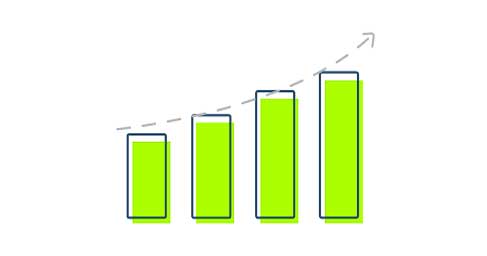
Maximize RCA Results with Causelink Enterprise
February 17, 2015
Causelink Enterprise helps teams get more benefit out of the problem investigation work they are already doing. With resources tight and a renewed focus on improving safety, quality, and reliability, this software helps investigation teams in the following ways...

Prevent RCA Skill Erosion
January 29, 2015
The most effective way to prevent RCA skill erosion is to plan ahead. Before you train your people in any RCA methodology, have a structured plan for how and when they will be expected to use the process.
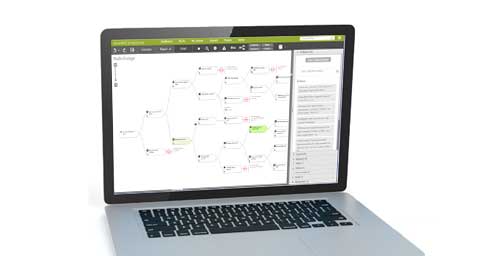
Causelink® Enterprise 2.0 RCA Software is released
January 21, 2015
Sologic recently released Causelink Enterprise 2.0, root cause analysis (RCA) software that helps teams collaborate to solve problems, find systemic risks, and share lessons learned.

Ebola Crisis
December 05, 2014
Taking on a worldwide health issue such as the Ebola crisis is a daunting task. So many voices have said so much about this subject already – what could those of us at Sologic possibly add to the discussion?

Just a routine operation
October 31, 2014
What would you do if your wife, mother of your two young children, died unexpectedly on the operating table?

Downsizing – Is it playing a role with today’s incidents?
September 15, 2014
Economists tell us we are 5 years beyond when the recession officially ended (I find this debatable). Anyway, companies have undergone dramatic changes to remain profitable. Supply chains have been squeezed, working capital cut, and cheaper materials sourced. Discretionary spending has taken severe hits across the board. Despite most organizations already being ‘leaned out’, for many managers, headcount reduction is one of the only levers left to cut costs further.

What’s the Value of RCA Training?
August 29, 2014
What kind of payback can you expect on your RCA training investment? Our clients have provided us the following data over the years based on hundreds of RCA’s they have shared with us: Average savings per RCA performed is approximately $25,000. Average return on investment (ROI) per RCA exceeds 1,000% (includes the cost of training, team RCA time and solutions)

Causelink Enterprise v2.0 Alpha 2 limited release
June 09, 2014
We have recently released the second Alpha for Causelink Enterprise Version 2.0. This internal Sologic release (North America and International Partners) is a significant milestone for our development team because all RCA chart and report functionality is now feature complete.

No Time For RCA?
May 27, 2014
A common theme I hear among clients is that they see the value in performing high-quality RCAs on their problems, but they lack the time to do a proper RCA. As a result, they often resort to shooting from the hip, or at best, using a basic approach such as 5-Why’s or Ishikawa diagrams just to deal with the situation and move on as quickly as possible.

Why Risk Management Fails...
May 07, 2014
In the current climate of uncertain economic conditions and constrained demand, businesses that wish to maintain and grow profits need to have dynamic processes for managing the risks associated with achieving their stated strategies and objectives.

Facilitation Tips – The Benefits of Critical Thinking in RCA Team Dynamics
April 16, 2014
When I conduct root cause analysis training and investigations, I notice how much the team dynamics play a role in the process, and thus in the outcomes, of the RCA exercises and facilitations. One factor that has a particular impact on those team dynamics is the atmosphere of critical thinking fostered by the company leadership and the RCA facilitator.

How Can Root Cause Analysis Help You as a Leader?
March 19, 2014
Root Cause Analysis is a process that can assist you, as a leader, to increase your knowledge and understanding -- to engage your employees and smooth your journey to transformational leadership in many ways.

People, Process and Culture in Health & Safety: Problem-Solving Skills Needed
February 10, 2014
There are three key aspects to warehouse health and safety: looking after people, designing processes with safety in mind, and developing a lasting safety culture. Good health and safety management, and safe working practices help keep people safe in a warehouse environment.

Use Root Cause Analysis to Improve Proposal Win Rates
February 12, 2013
Many of our clients invest substantial time and money into developing proposals. After a bid is lost, people are usually scrambling to chase the next RFP opportunity. A Sologic client who's involved in many large proposal processes, recently pointed out that companies could improve win rates by approaching lost bids like they would most other problems...with RCA.

Solve Problems by Understanding How Events Really Function: The Nature of Change, Transition Points
October 24, 2012
Change is fascinating and comes in many different forms. Look around you right now – you can see change in action, bundled up in packages we call “events”. An event is simply a unit of change – an excerpt from broader reality. A pine needle falling from a tree, steam rising off a hot cup of coffee, the door of a car opening and closing again… the seemingly ordinary, yet ultimately chaotic, march of entropy towards some distant state of equilibrium – the ultimate form of peace and quiet.

Stand Out in the Job Market: Augment Your Resume with Root Cause Analysis Skills
September 12, 2012
A recent Forbes article states that “74% of the workforce would consider leaving their current job if another offer came along”. Whether you are looking for a new opportunity or not, having solid problem-solving skills will benefit your current organization immediately, which is a definite plus.

What makes a good root cause analysis facilitator?
April 11, 2012
The reality is, the best choice is sometimes counterintuitive at first glance, so organizations often choose people who aren’t the best fit. Although it might take a little more thought and time to identify the right RCA facilitators, rather than jumping to the easy or typical choices, the pay-off will come in many ways...
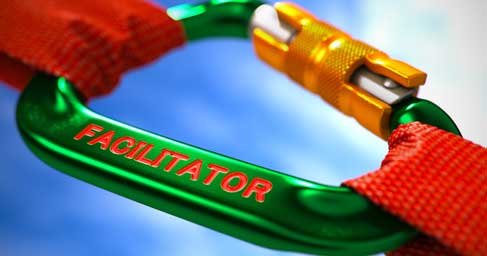
Hesitant to Facilitate a Root Cause Analysis? These Skills Will Help.
March 23, 2012
When we ask our root cause analysis students to share what part of conducting an RCA might feel the most uncertain to them, though they hesitate to admit it, we often hear that it’s the thought of facilitating a group of people through the process.

Six Steps to Solving Problems Proactively
September 29, 2011
Root cause analysis is most well-known as a tool to react to problems after they've occurred, but RCA is a powerful proactive tool -- identifying preventive actions that help reduce the risk of potential future problems from occurring. Here are some highlights from our presentation on this topic at UBM Canon ASQ Quality Expo 2011.
